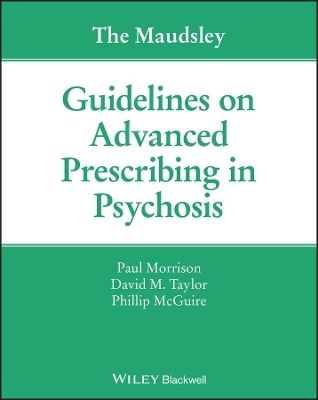
The Maudsley Guidelines on Advanced Prescribing in Psychosis
Wiley-Blackwell (Verlag)
978-1-119-57844-4 (ISBN)
The Maudsley Guidelines on Advanced Prescribing in Psychosis offers a resource that puts the focus on the need to treat the individual needs of a patient. The authors – noted experts on the topic – offer an alternative to the one-size-fits-all treatment of psychosis and shows how to build psychiatrist and patient relationships that will lead to effective individual treatment plans.
The book provides up-to-date data and information about commonly used anti-psychotic drugs and drugs used in bipolar disorder. The text weighs both the upsides and downsides of each pharmaceutical presented, and helps prescribers and patients weigh the costs and benefits of various options to reach an appropriate treatment plan. The authors highlight the treatment at a population level and the systems in which individual treatments take places. This important resource:
Facilitates the tailoring of an appropriate treatment plan for clients manifesting signs of psychosis
Offers a comparative strategy that helps gauge the suitability of one treatment plan over another
Provides at-hand data and information about commonly used anti-psychotic drugs
Includes an understanding of the origins and side-effects of each drug presented
The Maudsley Guidelines on Advanced Prescribing in Psychosis offers psychiatrists and other mental health practitioners an essential guide for treating psychosis on an individualized level.
Paul Morrison, PhD, FRCPsych., is a consultant psychiatrist in Argyll and Bute Hospital, Scotland, UK. He is also an honorary Clinical senior lecturer in psychopharmacology at the Institute of Psychiatry, Psychology and Neuroscience, King's College London, London, UK. David M. Taylor, PhD, FRPharmS, is Director of Pharmacy and Pathology at the Maudsley Hospital and is Professor of Psychopharmacology at King's College London, London, UK. Phillip McGuire, PhD, is a professor of Psychiatry and Cognitive Neuroscience and head of the Department of Psychosis Studies at the Institute of Psychiatry, Psychology and Neuroscience, King's College London, London, UK.
List of tables ix
Preface xi
Glossary xiii
Acknowledgments xv
Chapter 1 Psychosis 1
1.1 What is psychosis? 1
1.2 Lack of insight 1
1.3 Causes of psychosis 2
1.4 Schizophrenia: loss of personality and psychosocial decline 2
1.5 Bipolar disorder 3
1.6 Cannabis, synthetic cannabinoids, and psychosis 4
Chapter 2 Towards evidence based treatments for psychosis 7
2.1 Traditional medicine 7
2.2 The randomised controlled trial 7
2.3 The roots of community care 8
2.4 Treatment algorithms versus personalised care 8
Chapter 3 The antipsychotics 9
3.1 General principles in the pharmacology of psychosis 9
3.2 Neurotransmitters and receptors 10
3.3 Choosing drugs 12
3.4 Acute psychotic episodes 13
3.4.1 Olanzapine in acute psychotic episodes 15
3.4.2 Antipsychotic dosing in acute psychotic episodes 15
3.4.3 Timescale of response in acute psychotic episodes 17
3.4.4 Very agitated patients 17
3.5 The maintenance phase: relapse prevention 18
3.5.1 Beyond the early years: more harm than good? 18
3.6 The utility of long‐acting depot antipsychotics 22
3.7 Principles of long‐acting depot antipsychotic prescribing 23
3.7.1 Clozapine 25
3.7.2 Clozapine resistant psychosis 26
3.7.3 Side effects of clozapine 27
3.7.4 Myocarditis: inflammation of heart muscle 28
3.7.5 Cardiomyopathy: impaired function of heart muscle 29
3.7.6 The effects of clozapine at muscarinic M1–M4 acetylcholine receptors 29
3.7.7 Weight‐gain and type II diabetes 30
3.7.8 Neutropenia and agranulocytosis 30
3.7.9 Lowered seizure threshold 31
Chapter 4 Bipolar disorder 33
4.1 Diagnosis of bipolar 33
4.2 Treatment of mania 34
4.3 Treatment of bipolar depression 34
4.4 The maintenance phase of bipolar: relapse prevention 39
4.5 Bipolar in females of childbearing age 41
4.5.1 Valproate and carbamazepine in females of childbearing age 41
4.5.2 Lithium in females of childbearing age 41
4.5.3 Lamotrigine in females of childbearing age 42
4.5.4 Antipsychotics in females of childbearing age 42
Chapter 5 The role of talking therapies in the treatment of psychosis 43
5.1 Psychoanalytical insights 43
5.2 Psychological treatments 43
Chapter 6 Side effects of antipsychotic treatment 45
6.1 Weight gain 45
6.1.1 Antipsychotics at 5HT2c receptors 45
6.1.2 The management of weight gain and obesity 46
6.2 Type II diabetes 46
6.3 Dyslipidemia 48
6.3.1 The management of dyslipidemia in psychosis services 48
6.4 Motor side effects 49
6.4.1 Tardive dyskinesia 51
6.4.2 First versus second generation 51
6.5 Hyperprolactinemia 51
6.5.1 The management of hyperprolactinemia 52
6.6 Sexual side effects 52
6.6.1 Management 53
6.7 Prolonged QTc 53
6.7.1 Calculating the QTc 53
6.7.2 QTc thresholds 54
6.7.3 Torsades de points 54
6.7.4 Antipsychotics and QTc prolongation 54
6.7.5 Management 55
6.8 Neuroleptic malignant syndrome 55
6.8.1 Management 56
Chapter 7 Services: pathway specific care 57
7.1 Background 57
7.2 The at‐risk‐mental‐state 57
7.3 Early intervention services 58
7.4 Acute services 59
7.5 Continuing care services: promoting recovery 59
Chapter 8 Measuring outcomes 61
8.1 Value‐based healthcare 61
8.2 Evidence‐based healthcare management (EBMGT) 62
Appendix 1 Pharmacokinetics of selected psychotropics 65
Appendix 2 The metabolic syndrome 71
Appendix 3 Physical health monitoring for patients prescribed antipsychotics 73
Appendix 4 Physical health monitoring for patients prescribed mood stabilisers 75
References 77
Index 91
| Erscheinungsdatum | 17.01.2020 |
|---|---|
| Reihe/Serie | The Maudsley Prescribing Guidelines Series |
| Verlagsort | Hoboken |
| Sprache | englisch |
| Maße | 188 x 234 mm |
| Gewicht | 227 g |
| Themenwelt | Geisteswissenschaften ► Psychologie ► Klinische Psychologie |
| Geisteswissenschaften ► Psychologie ► Psychosen | |
| Medizin / Pharmazie ► Medizinische Fachgebiete ► Psychiatrie / Psychotherapie | |
| ISBN-10 | 1-119-57844-2 / 1119578442 |
| ISBN-13 | 978-1-119-57844-4 / 9781119578444 |
| Zustand | Neuware |
| Informationen gemäß Produktsicherheitsverordnung (GPSR) | |
| Haben Sie eine Frage zum Produkt? |
aus dem Bereich



